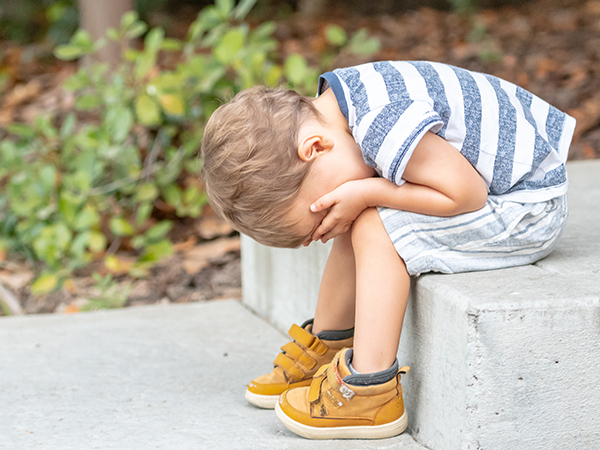Maggie Dent: Why parenting can make you really angry – and what to do about it

Have you ever had an absolute tantrum in front of your child as they’ve ignored your 48th instruction to go back to bed or give you back the iPad or put their shoes on or eat the dinner you so lovingly prepared?
Then parenting educator Maggie Dent has got some excellent and very reassuring advice for you.
Listen to Maggie Dent on Feed Play Love
Anger and Perfect Parent Syndrome
“Anger is a very valid human emotion to start with,” Maggie says. “People talk about good emotions and bad emotions but they’re all equally valid.”
“Underneath anger is a symptomatic emotion. There’s something underneath that,” she continues, noting that it could be insecurity, exhaustion or even unrealistic expectations.
“The research is really strong that our children need to see us angry at times,” Maggie told us.
Owning that anger, describing why you’re feeling that way with “I” statements — “I am feeling upset because I am tired and not sure how I can get you to give me the iPad” — can help to dissipate those big feelings, she says.
Don’t blame or target your child if possible, she suggests.
What’s the fix?
So what can parents do to prevent themselves from going from zero to uh-oh at breakneck speed? Start with adjusting those expectations, Maggie says.
“I’m so passionate about supporting today’s parents, because the landscape has changed so much,” Maggie told us.
“Not only are you expected to do so much more and be so much more perfect, you’re supposed to work full time and cook like a Masterchef and goodness knows what … there’s this massive expectation. There’s so much information on parenting that what’s happened is parents now have unrealistic expectations of what the role of parents is,” she explains.
“There are times that every parent – and I’m going to say every parent, including myself – gets really angry and frustrated because it is sometimes mind-numbingly, incredibly difficult. Let’s just be real.”

A recipe for anger
Maggie says that the resulting feelings of inadequacy and sense of failure can fuel our anger, simmering under the surface.
“We tell ourselves these internal stories that are not true, that then add to our own sense of inadequacy. And then when we’re feeling inadequate, we want to take it out on someone, because it’s a natural thing for us to want to project that in a form which is often an anger emotion.”
“Every parent will have moments when anger comes out that even frightens them,” Maggies says. “So that’s not a sign, again, that you’re a lousy person. It’s a sign that your nervous system is now too overloaded.”
Maggie says one solution to this overload is consciously taking time to to slow down and be in the moment.
“So what we’ve become is human doings, not human beings,” she explains, advising mums and dads to stop and remember to take three BIG breaths at least every hour or so.

Sigh of the times
Another surprising way to slow down those big emotions is to sigh, Maggie explains.
What the research shows is that if you start sighing more during the day, your vagus nerve, which runs down the centre of your body, brings your nervous system down a few cogs.”
She suggests a gentle sigh or even a really big sigh “like the holidays”.
“Your children will start sighing too,” Maggies says. “And if you can do a downward dog every now and then, walk outside and stretch and take some time, your children will start doing it.”
Build strategies for the home and in the classroom that work on the nervous system, she advises.

Lower the bar
Another strategy is readjusting your ideas of what parenting, kids and family look like.
“When our expectations of our self and our children are unrealistic and they cannot be met, then of course it’s going to make us feel frustrated.”
“I keep saying to parents, lower the bar. Lower the bar on how soon your son needs to be toilet trained. Lower the bar on how tidy the house needs to be.”
Maggie says parents also need to understand that it’s always going to be a bit of a scramble.
“You never get in front until they leave home,” she laughs.
Maggie also wants parents to know that expectations of small children are running very, very high. She advises parents to avoid comparing their child to others, noting that, “it all evens out at some point and red flags absolutely are quite noticeable.”
“I think we can back off a little,” she urges.
“Just let them be kids. Keep them alive. Let them play and explore the world and be as physically active as possible.”
 Need some support to be the best parent you can be? Our Parent School parent coaching experts can help. Click to find out more or book a one-on-one session.
Need some support to be the best parent you can be? Our Parent School parent coaching experts can help. Click to find out more or book a one-on-one session.









